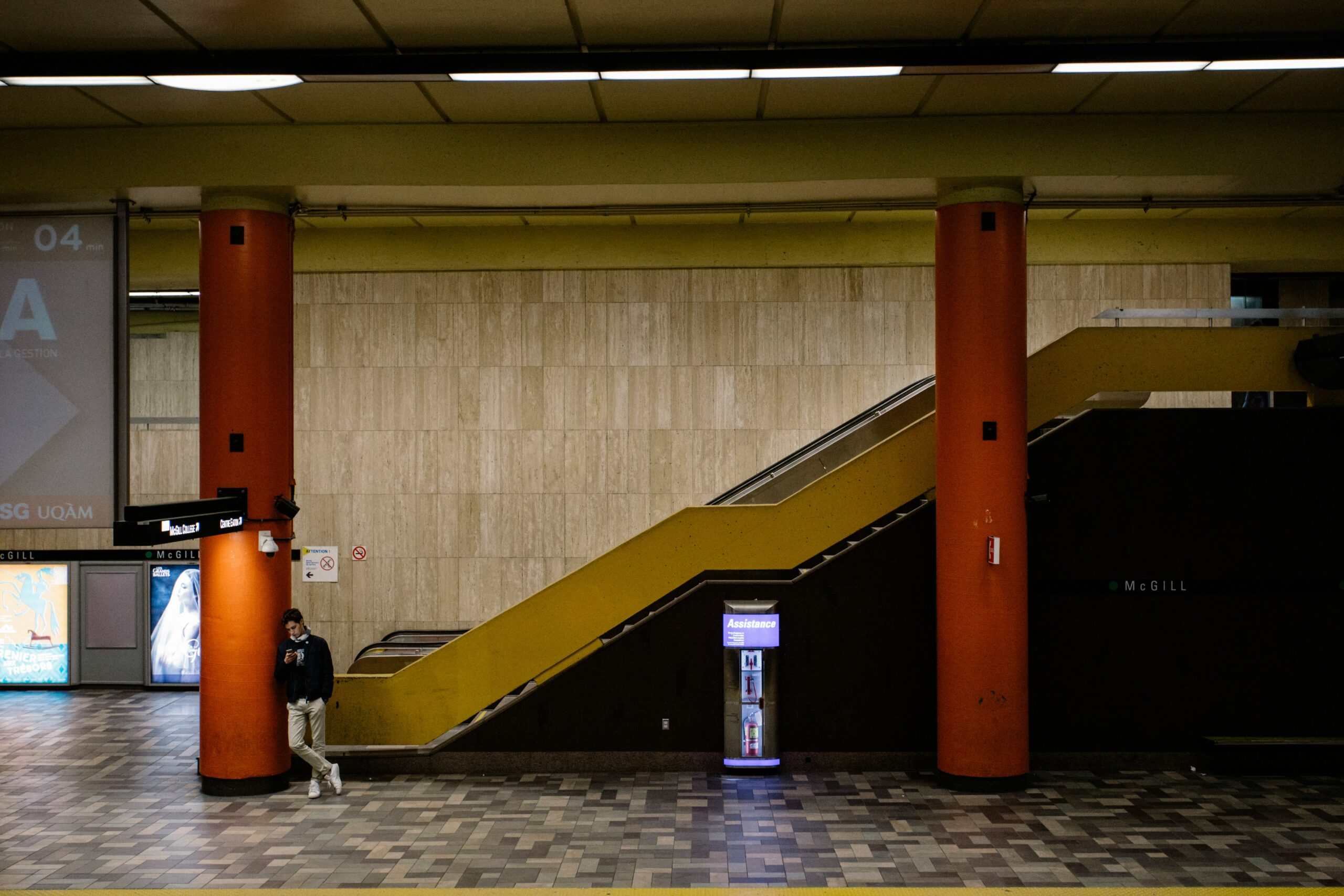The morning after the election, the city looks the same. Dry streets, brittle air, leaves pressed flat against the pavement. A jogger passes, breath clouding the cold, and somewhere, a car alarm starts and stops. Montréal continues its routine with the precision of muscle memory, a city that knows how to disguise grief.
Inside, the kettle cools on the counter. I stand at the window, watching the light shift across the buildings. The light is hard, metallic, the kind that makes everything appear sharper than it is. The silence in the room feels heavy, almost physical, like something you could lift with both hands.
Last night, Soraya Martinez Ferrada and Ensemble Montréal won the municipal election. The radio speaks of renewal, pride, stability. I picture the rented ballroom where speeches rang out: the clink of glasses, the smell of fabric softener and stage lights, laughter spilling into the dry streets, volunteers walking home beneath banners that promised progress.
Progress, they say. But I can’t feel it. The air still carries the weight of something unspoken. Every party with a chance built its platform on the same foundations: language purity, economic austerity, the management of difference. Whether they spoke of pride, efficiency, or neutrality, the promise stayed constant: belonging for some, permission for others, surveillance for the rest. Strategic voting wasn’t the failure. The ballot was the trap.
Some will say the vote split the left. They’ll insist that if we’d all lined up behind the same banner, things might have turned out differently, as if the problem were arithmetic and not ideology. As if the left they’re mourning hadn’t already increased police budgets, backed racial profiling, and dressed austerity in green. As if we were meant to keep voting for the same forces that have made so many of us less safe in our own neighbourhoods. There’s grief in watching people mistake management for care.
Anger doesn’t erase love. It sharpens it. Even as the slogans collapse, I keep seeing the city’s face in the small things that once felt like home. I’ve loved this place through every version of myself. Montréal shaped my language, my work, my survival. It taught me the pace of winter light, the generosity of strangers, the way care grows inside contradiction. It held me through uncertainty and exhaustion. It’s where I built kinship, where I learned that love can live inside ruins.
Lately, that love feels unreturned, and I know I’m not alone in feeling the distance widen. This loss feels like mourning in slow motion. What’s changing isn’t only the skyline or the slogans but the city’s sense of itself, the fragile coexistence that once made it possible to breathe here. Policies that promise safety and pride have become instruments of surveillance. Community centres lose funding while police budgets grow. Streets that once felt like gathering places now echo with a quieter kind of fear.
I watch it happen and recognize the pattern. The same language of order and belonging spreads far beyond Montréal, across the provinces, across the border. It’s a choreography of control disguised as care, a politics that tightens around what it names as protection. Each new measure asks again and again: who gets to belong, and who must disappear? I grieve not only the policies but the narrowing of imagination they bring, the loss of what this city once taught me, that people can make worlds together even when institutions refuse to.
The city that once felt expansive has begun to fold in on itself. The word values fills the news, followed by neutrality and order. The province denies systemic racism even as its laws rewrite language, dress, belonging. Policy takes the form of open arms that never quite reach. Every speech about inclusion carries the faint scent of repetition. This isn’t a sudden change. It’s the slow drift of habit, hardening like ice across the Saint Lawrence. The denial of injustice has become an everyday reflex. What I feel now isn’t surprise, but recognition. The city mirrors everything beyond it until reflection itself becomes suffocation.
That reflection doesn’t stay on the glass; it settles beneath the skin. The air thickens around conversation. What begins as policy ends as posture. The city lives in the body: in the jaw that tightens before speaking, in the breath that hesitates before it leaves. Doing Black queer and abolitionist work here means learning to breathe within narrow margins, shaping language that can move through corridors built for silence, carrying whole conversations in the space between what’s said and what’s permitted. I’ve written reports no one read, proposals that came back without comment. Each silence taught me another dialect. I’ve learned the rhythm of translation, not of language but of self, a fluency in shrinking. That quiet labour settles deeper still. The lungs forget how to widen. The skin learns to anticipate tension. The body absorbs every moment of being misunderstood.
And yet, grace persists.
A friend leaves soup at my door. A neighbour cracks a joke, and we both laugh longer than expected. A kiki ball fills the night with sound, and laughter becomes a kind of heartbeat. These gestures don’t repair anything. They make living possible within a structure that resists it. The tenderness of this city lives in the people who refuse to stop loving it. They keep planting, cooking, teaching, dancing, writing. They hold each other through exhaustion. They create small interruptions in the machinery of forgetting.
Love keeps me here. It isn’t safety. It is endurance, and endurance has a cost. I’m tired of pretending that staying is a choice. They say patience. They say progress. They say it takes time. But time is what they’ve stolen.
I’m nearing the end of my PhD, standing in the quiet between endings and beginnings. I’ve started reading job postings from other cities, looking for roles that might let me live and work at a distance. I read slowly, careful not to look too far ahead. I tell myself that leaving could continue what began here, that movement could be a form of care. Still, there’s guilt in mobility. Even leaving is a privilege, though it doesn’t feel like one. I’ll cross borders others can’t, carrying a passport built from contradictions. But staying has its own kind of disappearance.
Lately, I’ve been imagining what life might feel like elsewhere. The thought arrives gently, without certainty: rooms with different light, mornings that move without hurry, work that grows without needing to explain its own worth, air that feels generous. Beyond this city, there’s no clear refuge. Borders reopen old wounds. Fires, floods, droughts, storms, fear. Billionaires call their escape routes progress while governments trade care for resilience.
I keep hearing the same logic in every headline. The slogans change, but the project’s the same: control the language, control the border, control the breath. What’s happening here isn’t local; it’s the rehearsal of a world learning to survive its own cruelty. Everywhere, the same sentence repeats: you’re on your own.
And yet, even in that sentence, I hear an echo — the sound of people refusing to let the world end quietly.
I think about the scale of this unravelling, and about the people who still find ways to love. I think about how living with honesty feels like defiance. I want to spend what time remains building something that holds life, like a room with open windows. I want to work with intention, to write with purpose, to live without apology. I want to move through a world that gives instead of withholds.
Montréal stays inside me: the bagels on Saint-Viateur at two in the morning, the smell of snow, the hum of the métro at night, church bells layered with ambulance sirens, the sound of languages mingling in a café, the sight of people helping each other carry groceries through the rain, laughter and smoke drifting from balconies into the dark. These memories form a pulse. They remind me that a city isn’t only its institutions; it’s the gestures that persist. I hold those gestures close. They’re what keep the city alive when the headlines fail it.
When I walk to the river, I listen. The water moves without hesitation. It carries the weight of the sky and keeps going. I think of other seasons: the river in thaw, in flood, in stillness under ice. The city has always tried to contain it, yet the current keeps finding its own line. I stand at the edge and feel the cold reach my fingers. Behind me, the city hums. Ahead of me, the current folds into itself, steady and endless.
Movement feels like a kind of truth. I don’t know if I’ll leave, or when, or where I’ll go. I only know I’ve started to listen for motion. Montréal lives in me: the rhythm of its languages, the tension of its contradictions, the lessons in its beauty and its harm. I’m still here. I’m already elsewhere.
I want a life that breathes. I want to find places where care isn’t a performance, where living doesn’t require permission. I don’t know if those places exist, yet I move toward them, in thought, in hope, in practice.
The river keeps its rhythm. The wind carries the scent of cold. I whisper gratitude for what this city has given, and for what I’ve learned in its arms. Then I turn toward home, where the kettle waits on the counter, and the light settles once more across the window.


Leave a Reply